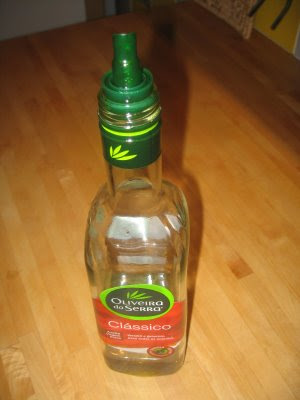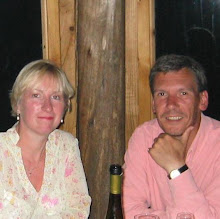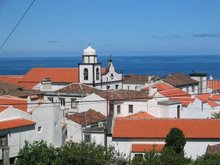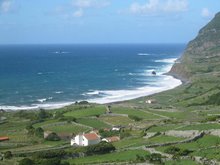I left you last time in 410AD when the Romans had sloped off leaving the Celtic Romano-Britons to fend for themselves in the face of attacks from Teutonic Angles and Saxons from north east Europe.
Starting in south east England, the Anglo-Saxons pushed their conquests slowly north and west for the next 250 years until the Celts had been pushed back to the fringes - Cornwall, Wales and Scotland.
If King Arthur (of Round Table fame) existed at all, then it was at this point in British history - the 5th or 6th century AD: he would have been a native Celtic Briton fighting Anglo-Saxon invaders. He's most commonly associated with south west England and Cornwall but Scotland stakes a claim to Arthur due to a prominent hill in the middle of Edinburgh called Arthur's Seat (pictured below) - I don't believe it myself.

What is certain is that the Anglo-Saxon kingdom of Northumbria - the land to the north of the Humber estuary half way up the east coast of England - with its capital at Bamburgh Castle on the Northumberland coast between Newcastle-upon-Tyne and Berwick-upon-Tweed extended its territory north of the Tweed to occupy the eastern half of what is now Scotland south of the Forth-Clyde line.
This Anglo-Saxon settlement of a big chunk of what is now Scotland is interesting for a number of reasons. It explains the existence in this part of the country of lots of English sounding placenames like Coldingham, Haddington, Swinton etc. Indeed what about Edinburgh - it's the capital of Scotland but it's not a quintessentially Celtic Scottish name like Inverness or Aberdeen is it?
It's commonly believed that Edinburgh derives from "Edwin's Burg" - Edwin being a quintessentially Anglo-Saxon name and burg being the teutonic word for a fortified town as in all the places in Germany which end in -burg (although I'm struggling to think of one now - Strasbourg is in France, inconveniently. Magdeburg. Hamburg.) But it's not. Edinburgh is an English translation of the previous Celtic name
Dyneidin (I think that's how it was spelt) meaning the fort (
dyn) of
eidin - can't remember what that means now, it might be a personal name. Below is Edinburgh Castle - the original
Dyneidin - on its volcanic crag although there's nothing in this picture that's older than the late 18th century:-

Anyway, all these names are English sounding not just because they're places quite close to England but because, for the thick end of 500 years (c. 500AD to c. 1000AD), they were actually IN England! Or, it would be truer to say, in one of the polities (Northumbria) which eventually merged to form England.
As a native of Edinburgh, I get majorly hacked off by modern political correctness which purports that Gaelic is somehow the lost "true" language of all Scotland banished to the outer fringes by some sort of cultural genocide of recent centuries by the English. This results in official signs in Gaelic being plastered all over the place. The truth of the matter is Gaelic has NEVER been the language of huge areas that are now Scotland including, no less, it's capital city! English has been our language for 1,500 years and Edinburgh arguably has more cultural affinity with London than with Inverness! As a matter of fact, there are more people who speak Urdu and Punjabi in Scotland than Gaelic. But try and explain that to a Scottish Nationalist politician grandstanding about Gordon Brown (the prime minister of the UK, a Scotsman) supporting England in a football competition Scotland hasn't qualified for ... Gah! it makes me cross.
Anyway, back in the Dark Ages (=approx. 400AD to 1000AD), the high water mark of Anglo-Saxon expansionism in the north came in 685AD when the Northumbrians crossed the Firth of Forth and took on the Picts. But the Picts won when the Northumbrians were beaten at a battle called Nechtansmere: it is reckoned to have been fought at a place called Dunnichen in Angus just north of the Firth of Tay. I wish I could tell you who the rival kings were but I can't remember: this is history without looking it up. I'm thinking Oswiu of Northumberland and Bridei of the Picts but I could be wrong. Which is inexcusable because Nechtansmere is arguably a more fundamental battle in the history of Scotland than Bannockburn. Below is a picture of a contemporary carved stone at a place called Aberlemno near Dunnichen believed to depict the Battle of Nechtansmere:

Net result, the Anglo-Saxon Northumbrians retreated south of the Forth and their northwestern frontier was fixed at the Pentland Hills which run south west from Edinburgh: it's said "Pentland" is a corruption of "Pict Land" in the sense that this was where the vengeful Picts stopped chasing the vanquished Northumbrians south and east. But I don't believe that either.
Just time to mention another polity of Dark Ages Scotland - Strathclyde. This was the remaining P-Celtic (Briton) kingdom south of the Forth-Clyde line which was not conquered by the Anglo-Saxons. It's capital was at Dumbarton - Dun = fort, barton = breatann = Britons. Pausing to recall that, minding their own business during all this Anglo-Celtic angst, a tribe of Irish Gaels called Scots were camping out in Argyll in a kingdom called Dalriada, let's summarise the polities of Scotland in 685AD:-
Picts - P-Celts - north east
Dalriada (Scots) - Q-Celts (Gaels) - north west
Northumbria - Anglo-saxons - south east
Strathclyde - P-Celts (Britons) south west

And finally, if anyone's not interested in the History of Scotland posts, could you leave a comment (or even if you are). Ta.



 All, of course, washed down with lashings of bogging juice.
All, of course, washed down with lashings of bogging juice.

















































